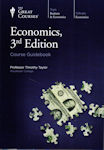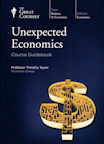This is the course guidebook that accompanies the 36 lecture “Great Course” of the same name. It is essentially an abbreviated transcript of each lecture, a few pictures, and some related reading. (I watched the lectures, which is what I am reviewing here, and am using the book simply as an aide-memoire.)
Taylor gives an overview of the topic of Economics, covering microeconomics (the results of the choices and behaviours of many individuals) and macroeconomics (large scale aggregate policies). So we get supply and demand, labour and wages, saving and spending, and regulations. We also get fiscal and monetary policy, balance of trade, unemployment and inflation. All this is explained through a pure economic lens, with demonstrations of how various goals can suggest incompatible policies. He also discusses topics such as poverty and pollution, how typical attempt to solve the problems don’t make sense economically, and how different approaches might fare better.
This provides a good overview of the concepts and terminology. I’m sure if the world was populated purely by economists like Taylor, with no short-term desires from politicians and share holders, no greed from manufacturers and financiers, and no criminals circumventing regulations, then pure market forces might make for a better world. But, particularly in the light of the subsequent to this publication financial crisis of 2008, and some current interesting applications of trade policies, I remain to be convinced it is as easy as Taylor makes it appear.

